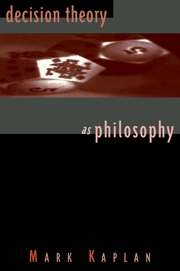Book contents
- Frontmatter
- Contents
- Preface
- Note to the Reader
- CHAPTER ONE Confidence
- CHAPTER TWO Evidence
- CHAPTER THREE The Bayesian Challenge
- CHAPTER FOUR Rational Belief
- CHAPTER FIVE The Bayesian Canon
- CHAPTER SIX Decision Theory as Epistemology
- APPENDIX 1 Principles and Definitions
- APPENDIX 2 Proofs
- APPENDIX 3 Probabilism – Some Elementary Theorems
- Bibliography
- Index
CHAPTER FIVE - The Bayesian Canon
Published online by Cambridge University Press: 05 June 2012
- Frontmatter
- Contents
- Preface
- Note to the Reader
- CHAPTER ONE Confidence
- CHAPTER TWO Evidence
- CHAPTER THREE The Bayesian Challenge
- CHAPTER FOUR Rational Belief
- CHAPTER FIVE The Bayesian Canon
- CHAPTER SIX Decision Theory as Epistemology
- APPENDIX 1 Principles and Definitions
- APPENDIX 2 Proofs
- APPENDIX 3 Probabilism – Some Elementary Theorems
- Bibliography
- Index
Summary
The Dutch Book Argument
What do you consider a fair price for a wager which pays $1 if p is true; nothing otherwise? To keep you honest, we can rely on the wisdom of Solomon: You set the price, but I decide whether you buy the bet from me or I buy the bet from you. The price you judge to be fair for this bet we will take as your personal probability for p.
Certain features of personal probability follow immediately: (I) You would be mad to have a personal probability greater than one or less than zero, for in the first case I could sell you the bet for more than you can possibly win, and in the second case I could buy it from you for less than nothing, i.e., you would pay me to take it off your hands. (II) You had best give a tautology, p or not-p, personal probability one and a contradiction, p and not-p, personal probability zero, for a bet on a tautology is a bet that you must win and a bet on a contradiction is a bet that you must lose.
Another property follows almost as quickly. Suppose that you buy (sell) a bet that pays $1 if p but nothing otherwise for $.25 and that you buy (sell) a similar bet on q for $.50 and that p is logically incompatible with q.
- Type
- Chapter
- Information
- Decision Theory as Philosophy , pp. 155 - 180Publisher: Cambridge University PressPrint publication year: 1996

